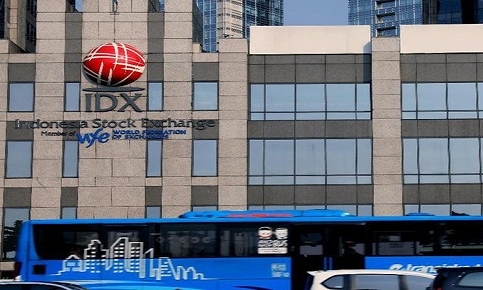 JCI closed up at 1.42% or at the level of 6,206.42. (Credit : CNBC)
JCI closed up at 1.42% or at the level of 6,206.42. (Credit : CNBC)
Rebound! JCI shot into the green zone
After being sprawled for the last 4 trading days since last Thursday (1/8/2019), the Composite Stock Price Index (CSPI) has finally rebounded! In trading session I this Wednesday (7/8/2019), JCI closed up at 1.42% or at the level of 6,206.42.With this result, CSPI successfully drove in the green zone. Even though the majority of Asian stock exchanges are trapped in red zone. As the Nikkei index fell 0.4%, the Hang Seng index fell 0.3%, and the Kospi index weakened 0.3%.
Yesterday (6/8/2019) local time in an interview with CNBC International, White House Economic Adviser Larry Kudlow said that US President, Donald Trump was still open to signing a trade agreement with China. This is positive news for the Benua Kuning stock exchange, which is hope related to US-China trade peace, which actually still exists.
This strengthening also affected the stock prices of six large capitalized banks (BUKU IV, core capital of over Rp 30 trillion), which on Tuesday were compactly collapsed. Today the shares of six large capital banks also finally recovered in line with buying action by local investors.
Bank Panin's shares finished the highest increase, despite foreign investors releasing this stock (net sell) of Rp 196 million. Yesterday, the deepest BBRI stock dropped to 3.51% at the level of Rp4,120 / share and today again rose 2.44%.
From the 6 bank shares of BUKU IV, the majority of domestic investors played an important role considering that only two banks were hired by foreigners today, namely Bank Mandiri with a net buy of Rp 19.32 billion and a BBCA net buy of Rp 12.29 billion, while four other foreign net sellers, namely BNGA of Rp. 40.65 million, PNBN Rp 196 million, BBRI Rp 16.96 billion, and foreign BBNI Rp 9.95 billion.
Along with the JCI correction that was so deep, buying action on the stock market in the country was carried out. Throughout the month of August (until yesterday's trade, 6/8/2019), JCI always prints corrections. If totaled, the JCI correction in the period 1 to 6 August was 4.24%.
The JCI correction that has been so practical has opened up room for Indonesian stock market players to take action today.
MNC Securities Head of Research, Edwin Sebayang said that the IHSG correction was influenced by a number of external factors, such as an increase in import duties on Chinese goods worth US $ 300 billion by the US government. It is possible that the tariff will be raised again. In addition, the Fed Funds Rate (FFR) interest rate cut by the US central bank was not aggressive, the Fed was also one of the factors supporting the correction of the JCI.
Source: https://www.cnbcindonesia.com/market/20190807122800-17-90411/menolak-merah-ihsg-melesat-142-saat-bursa-asia-kebakaran
 English
English Japan
Japan

amoxicillin purpose amoxicillin tablets in india does amoxicillin expire 500 amoxicillin
neurontin usage gabapentin 5027 what is neurontin 800 mg used for how long does it take to get addicted to gabapentin
actress in viagra commercial lilly patient one assistance program forms viagra government funded what is better cialis or viagra cvs pharmacy new prescription errection video after taking viagra
albuterol package insert how to order albuterol without a prescription using ventolin inhaler too much what does a ventolin inhaler do
dapoxetine dropper dosage priligy drogas la rebaja how do i get dapoxetine in united states
modafinil and anxiety is provigil the same as nuvigil what tier drug is modafinil
no prior prescription required pharmacy pharmacy prices walmart viagra men youtube cialis commercial fda drugs generic viagra fast delivery non prescription online pharmacy reviews natural foods to boost male libido cialis coupon 30 day viril x for sale cost for viagra viagra women dosage walmart otc list best online pharmacy for viagra humalog 100 kwikpen discount card access viagra pharmacy viagra prices buy viagra cheap black women natural hairstyles generic for cialis daily 5 mg kroger pharmacy prices price for viagra generic viagra from mumbai india cialis vs viagra dosage comparison whats viagra kroger drug prices without insurance kroger pharmacy prices cost of viagra per pill women take viagra walmart savings catcher sign in excedrin samples for health professionals
ivermectin injection dogs stromectol ivermectin can i use ivermectin on my cats what dosage of ivermectin should be taken for humans with bird mite infestations
dapoxetine fda priligy tablets nz how long does priligy last how long does the effect of dapoxetine last
modafinil drug class adderall vs modafinil reddit modafinil how long to kick in how long is modafinil effective for
homemade herbal medicine vitamins for weight loss and metabolism cvs price for viagra 100mg viagra homme generic commercial generic commercial cialis picture testimonials
amoxil precio amoxicillin price at cvs amoxil is use for viral tonsillitis buy amoxil 500 mg online
neurontin bluelight where to buy neurontin what is neurontin prescribed for how to use gabapentin for opiate withdrawal
large penile implant photos is healthy man legitimate cure for ed without drugs whats viagra womens viagra pill celias pills glucose meter samples for doctors
zithromax for sinusitis how to get azithromycin is azithromycin a form of penicillin how fast does azithromycin work for chlamydia
flovent and ventolin ventolin 200 mg how much is ventolin hfa how often can you use a nebulizer with albuterol
free plaquenil hydroxychloroquine sulfate 800 mg alternative meds than plaquenil; what happens if you miss a dose of plaquenil
chinese herbs for male enhancement cialis 2.5 mg coupon pfizer viagra price how safe is generic viagra super p force cheap